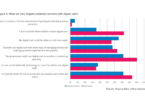Yesterday Republican Congressman Tom Emmer introduced the CBDC Anti-Surveillance State Act. Emmer said the aim is to prevent “unelected bureaucrats” from “stripping Americans of their right to financial privacy.” Most will appreciate Emmer’s objective. However, the Bill might need to be longer than three succinct pages to achieve that aim.
The document blocks the Federal Reserve from issuing a central bank digital currency (CBDC) direct to consumers or allowing individuals to hold an account directly with the central bank. That means any digital dollar would have to go via intermediaries and favors a token-based CBDC.
If the Bill was enacted, it’s still conceivable that intermediaries such as banks could be required to share personal data with the central bank. However, the Federal Reserve has stated that it aims to ensure privacy. The central bank still would likely require banks to implement anti money laundering (AML) processes for any CBDC.
During the Covid trucker protests, Canada demonstrated that these AML protocols can be hijacked for other purposes. That recent precedent makes it harder for every central bank worldwide to make the privacy-friendly CBDC argument. However, the Canadian example highlights that these sorts of privacy challenges apply to any regulated money, not just CBDC. A CBDC might accelerate the decline in cash usage for payment, bringing more transactions into the AML surveillance net.
So to protect privacy, there would need to be some block on any government department, including the IRS, making use of CBDC transaction data. It’s possible to enforce AML in a privacy-preserving manner where a bank processes AML checks but only shares details of highly suspicious transactions, such as from a wallet that has received or sent money to a dodgy address. Current AML systems result in large volumes of private bank transaction data being unnecessarily shared with various agencies.
So for a privacy-friendly CBDC, AML processes need an upgrade. Perhaps that might come in a separate Bill.
Emmer’s Bill also prevents a CBDC from being used for monetary policy, effectively prohibiting it from paying interest and hence protecting banks. Additionally, the central bank has to consult each regional Federal Reserve regarding the pilot program and report to Congress on progress.






